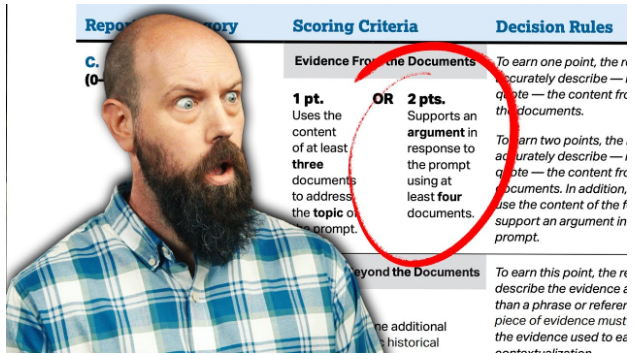In the midst of AP exam season, it can be hard to focus on anything other than practice MCQs (Multiple Choice Questions), essay drafts, and sleepless nights calculating your predicted exam scores on Albert.io. However, many students this year have been spared from the incredibly high standards previously expected by College Board due to their changed rubrics in many different subjects.
As a fellow victim of one of the hardest AP Courses to grace this planet, AP US History, you can imagine the envy when I heard about the facilitative changes made to the Document-Based Question (DBQ) and the Long Essay Question (LEQ). On a bright November afternoon, months after I’d taken the dreaded exam, I stumbled upon a Youtube video posted by the savior of students taking AP History courses, Heimler’s History, entitled, “The DBQ Just Got WAY EASIER! (MASSIVE Rubric Changes for 2023-2024)”. This was…upsetting to say the least.
For context, Quad Education describes the DBQ as “a timed essay used in AP History exams [where] students are provided with 7-12 historical documents and must use their content to write a thesis-driven essay that answers a prompt.” There are a total of seven points that can be earned on this essay. Originally, for the second evidence point, students needed to use at least six of the seven documents to earn credit, but now, students only need to use at least four documents to earn this point. In the sourcing part of the rubric, only two documents are required, rather than the previous three needed. Additionally, the complexity point is now much more achievable on both the DBQ and the LEQ. This is known to be the most difficult point to earn on the entire exam, with a very low percentage of test takers earning it.
These changes are likely due to the extremely low pass rate for these exams, with many history courses like APUSH and AP US Government having below a 50% passing rate of a 3 or higher in 2023.
Overall, future students are rejoicing over these changes, as their score (and their sanity) will benefit, and they’ll feel a little bit better about their seemingly endless studying.
Although I am envious of the pupils taking the 2024 exams, I know these rubric changes were for the best, as they reduce the stigma against the tests and their difficulty. However, I do feel as though intense rigor is sometimes needed, and the AP program is formulated to simulate a college course taken by high schoolers. For the sake of AP’s reputation, hopefully this facilitative trend will not continue and no further adjustments will be made





































